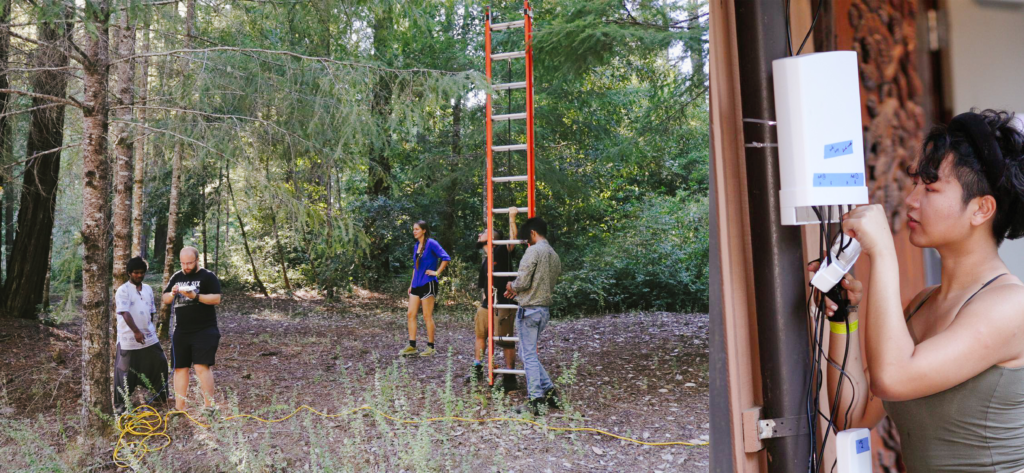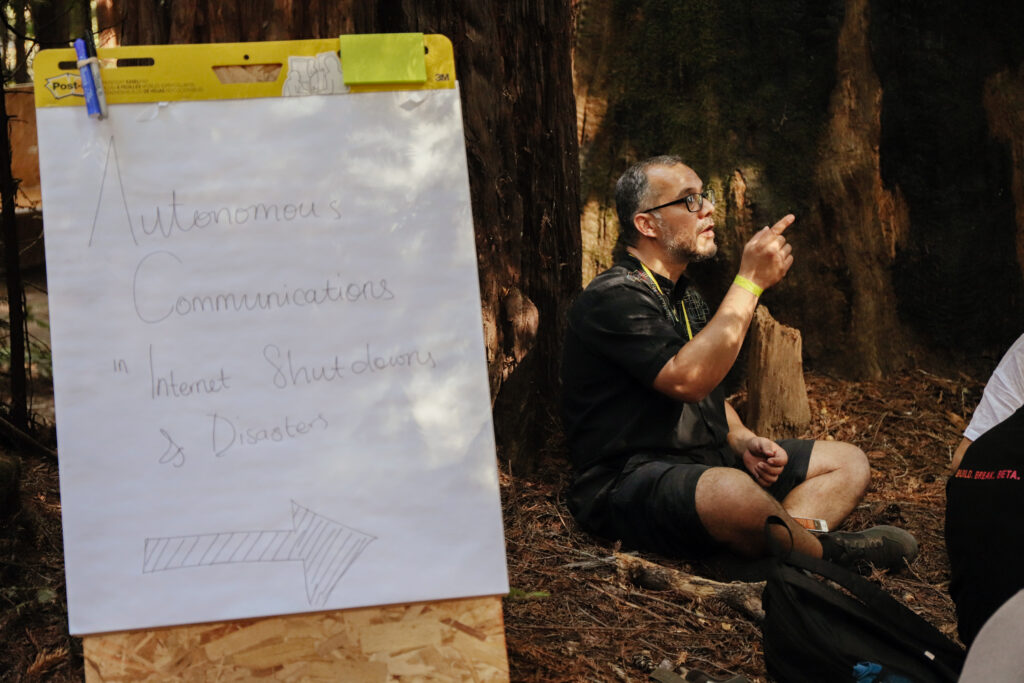
Guest blog by ngọc triệu from the DWeb Camp Core Organizing team.
Thank you to all who joined us in our Information Sessions and took the time to share your questions with us over the past month. We received a great number of inquiries and have tried our best to answer them in this blog post.
If you find that your questions are not covered or if you need further clarification, please don’t hesitate to reach out to us at dweb+fellowship@archive.org.
Fellowship
Q: What are the qualities that you are looking for in Fellows?
A: In selecting Fellows, we seek individuals who are building or leveraging network technologies to uplift communities facing systemic inequality and help bring about autonomy, resilience, justice and social equity. Rather than adhering to a rigid set of criteria, we embrace diversity in backgrounds and expertises among our Fellows.
Learn more about the qualifications here.
Q: How are the Fellows selected?
A: The Fellows are chosen by the Fellowship Selection Committee, which comprises past Fellows and members of the DWeb Core Team. Applications will be evaluated across four key areas:
- DWeb Technology and Organizing: To what extent does the applicant utilize decentralized web technology and/or decentralized organizing tactics to tackle real-world challenges?
- Community Engagement: How actively does the applicant work directly with and for under-resourced constituencies or marginalized communities?
- DWeb Principles Alignment: Does the applicant and their work resonate with the values and spirit of the DWeb Principles?
- Camp Participation: To what degree would the applicant benefit from attending Camp, and vice versa, how important is it that their perspective and experience is shared at the event for others to learn from?
Q: Do Fellows have to be super technical (in other words, do they need to know how to code)?
A: No. Even though we prioritize applicants who have experiences developing and utilizing DWeb technologies in their work, we have also accepted Fellows who are not as technical in the past.
Q: What’s the best way to prepare for an application?
A: The best way to prepare for your application is familiarize yourself with the DWeb Principles. You can also gain insight into previous Fellows and their projects: 2019 Fellows, 2022 Fellows, 2023 Fellows. This will help you assess whether you and your projects align well with the Fellowship Program.
If you have a technical background, emphasize how your work relates to DWeb technologies and their application in real-world situations. For non-technical applicants, discuss how your work could benefit from DWeb technologies and outline the support or connections you are seeking for at Camp.
We value brevity in responses. If you choose to apply through a written application, consider drafting your responses in a separate document to avoid losing your work while using a browser.
Q: What kind of knowledge, skills, and/or experience do you expect Fellows to share?
A: Fellows are expected to share about the projects they work on and intend to present at Camp. This might encompass practical knowledge, professional skills, community stories, and related work experience, such as how they have utilized DWeb technologies to address the challenges facing their communities.
Q: What are examples of workshops or presentations that Fellows have organized at camp in the past?
A: Here are some examples of workshops and talks the our previous Fellows organized:
- Co-creating Terrastories. A multi-day build-a-thon workshop where participants worked on improving Terrastories (an open-source, offline-first app for mapping oral histories) to better suit the needs of the Haudenosaunee Indigenous community who are mapping traditional knowledge of water alongside scientific research about river contamination. Led by Rudo Kemper, 2022 Cohort and the Digital Democracy team.
- Mesh Network Building Session. A workshop where participants learned how to crimp ethernet cable, build wireless links, and attach applications to the DWeb mesh community network. Led by Esther Jang, 2022 Cohort.
- Old Policy, New Tech: Reconciling Permissioned Blockchain Systems with Transatlantic Privacy Frameworks. A talk by Remy Hellstern, 2022 Cohort.
- This Is a Journey Into Sound: A Proposal for Beats, Tech and Future Economies. A workshop led by brandon king & Stacco Troncoso, 2023 Cohort.
- Data Feminism: An Intersectional Approach to Data Gathering, Analyzing, and Sharing. A workshop led by Jack Keen Fox, 2023 Cohort.
- Designing for Intersectional Data Sovereignty. A talk by Camille Nibungco, 2023 Cohort.
Q: How big will the cohort be this year?
A: We aim to bring approximately 20 to 25 Fellows to DWeb Camp this year.
Q. Does the Fellowship cover visa fees?
A: No, unfortunately, we can only cover travel expenses to/from your place of origin to Camp. However, we can provide you with a sponsorship letter and request expedited processing for your visa.
Q. Does the Fellowship cover travel from where the applicant is to Camp and back? What about food?
A: Yes. If you arrive at Camp with a car, your gas and related expenses will be reimbursed. If you require a flight, our team collaborates with a travel agency to assist you in arranging your travel to and from Camp. In some cases, we can provide a stipend for taxi fares and meals when you’re in San Francisco.
At Camp, all meals are provided, including breakfast, lunch, dinner, and late-night snacks. Please note that there are no financial transactions at Camp and we encourage our campers to bring snacks to share with the community.
Q. Do you have to know how to set up a tent?
A: No. As Fellows, your accommodation will be provided for you. However, if you are interested in learning how to set up a tent, we are happy to show you how during Build Days.
Q. Where to find prior nodes? Has there been traction from Fellows to set up new nodes in their country beyond the US and Europe?
A: You can find a listing of all DWeb nodes here. Our Fellows have organized events and contributed to their local nodes worldwide over the past years. Last year, a few Fellows gathered and hosted the first DWeb Camp in Brazil with the support of CooLab.
You can read our reflections about the event here (in English) and here (in Spanish).

DWeb Camp
Q: What’s the focus of DWeb Camp this year?
A: The theme of DWeb Camp 2024 is Migration: Moving Together. We’ll be exploring how we can move together toward the Web we want and deserve. Stay tuned for more information on our website!
Q: What other types of projects and organizations are represented at Camp?
A: There is a diverse range of projects and organizations at DWeb Camp. Please take a look at the project and people directory from DWeb Camp 2023 here.
Q. How many people do you expect to attend DWeb Camp this year?
A: Last year, we had approximately 470 attendees and 35 Fellows at DWeb Camp. It’s worth noting that our event caters to a diverse age range, as we welcomed 25 attendees under the age of 18. We expect the same amount of attendees this year.
Q. Can you explain the different ways to volunteer if I’m not selected as a Fellow?
A: Yes! There are three ways to volunteer:
1. Space Steward. As a Space Steward, your responsibilities include organizing and managing the schedule for your space, ensuring familiarity with Camp Navarro, and preparing the required space, equipment, and materials for talks and workshops. Your Camp ticket will be provided.
2. Camp Volunteer. As a Camp Volunteer, you’ll assist in setting up and taking down camp infrastructure, handling various kitchen duties, cleaning up, etc. You’ll be asked to work five 3-hour shifts (total 15 hours). You’ll receive a 50% discount on your camp ticket.
3. Weaver. As a Weaver, your role involves facilitating conversations among campers within small groups during Camp. This position is not compensated and requires the least time commitment.
Learn more about different ways to volunteer at Camp here.
Q: How are DWeb Camp & the Fellowship funded?
A: DWeb Camp and the Fellowship Program are funded by various organizations and individuals. Some of our past sponsors include the Internet Archive, Filecoin Foundation, Ford Foundation, Mask, Gitcoin, Jolocom, Bluesky, Ethereum Foundation, and more.